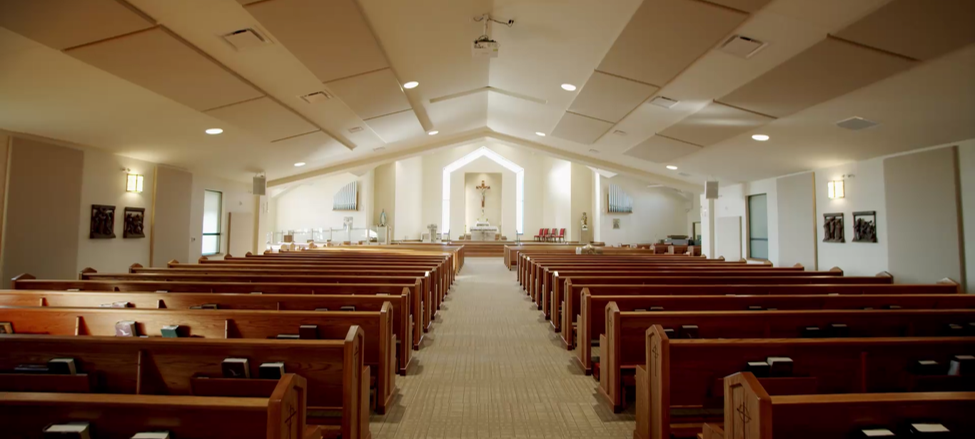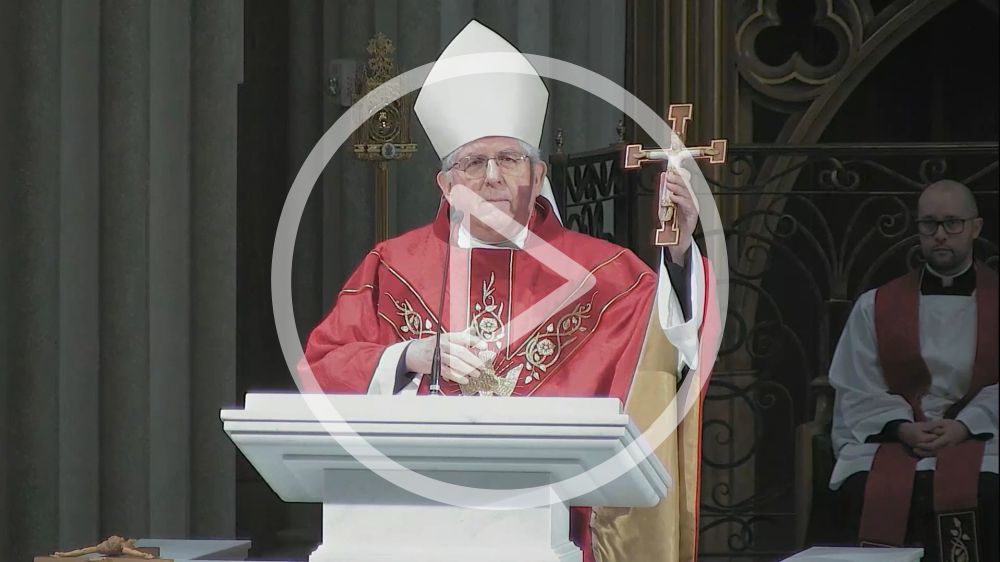
Cardinal Collins Good Friday Homily
Cardinal Thomas Collins, Archbishop of Toronto, gave the homily below at St. Michael's Cathedral Basilica on Good Friday, 2020.
Many years ago, when I was in university, I devoted myself very much to the study of English literature, to Old English poetry. And one poem that really touched my heart is a very ancient one. It's well over 1,200 years old. It's called “The Dream of the Rood," the dream of the cross. And in it, the poet has a vision in the depths of the night, when all are asleep. And he sees before him the cross of Christ raised up on high. And at first, he sees it sparkling with gold, and jewels, and diamonds, and it is glorious.
And then that cross transformed. And it is stained with the blood of sacrifice. And throughout the poem, we have that going back and forth. The cross of glory, the cross of divine majesty and the cross of human suffering. And each of these dimensions speak to us of why we call this Friday good. It is the cross of majesty and we see God's presence amongst us. And our Lord Christ is on the cross, and it is the cross of suffering, and we are thankful that God has entered into this world.
Even in the time, around the time, of “The Dream of the Rood," when people began to put the figure of Christ on the cross, it's interesting. It wasn't what we're used to. The earliest forms of crucifix were like this. It is not at all what you would have seen if you had been at Calvary. No, we see Christ in priestly robes with a crown upon His head. And yet, this is what is happening at Calvary.
This is why this Friday is Good Friday, because it is the Lord God coming amongst us, suffering and dying for us in this world. This is the cross of majesty, of divine glory. The same time, many years later, several hundred years, we begin to have the kind of crucifix we are more familiar with. The crucifix which shows the suffering of Christ, which is more like what we would have seen, had we been there that first Good Friday.
And this, also, is why we give thanks to God. For the Lord God, the second person of the Trinity, did not cling to His equality with God, but emptied himself. Even to death, death on a cross. And so we give thanks to God and all His glory, who put it aside to come to be with us.
And so it is, too, in the Gospels. Every Palm Sunday, we hear the Gospel either Matthew or of Mark or of Luke. It varies through the years. And in the Gospels of Matthew, Mark and Luke, we become attentive to the Lord, who came amongst us, who suffered, experienced human suffering. Through sweat, with blood, in the Garden of Gethsemane. He is there, so close to us.
And that consoles us in this world, where we know that God does not dwell in icy splendor, but has come into this world to be with us. We cannot say to Him when we come before Him, whenever that may be, that you do not know what it is like. He has been here through rejection. He has been here through physical pain, through injustice.
He has seen it all and experienced it all. And out of the midst of that experience of human evil and of the weakness and frailty and danger and cruelty of this world.
He says, "Father, forgive them. They know not what they do."
Out of the darkness of that first Good Friday, we see the light of His love. The light of His compassion. We see the suffering of Christ.
And so we see in the Gospels of Matthew, Mark and Luke. Those are the gospels that emphasize that. But it is interesting that on Good Friday itself, that theme, that message of suffering, of compassion, it's what we hear of in the first reading from the Prophet Isaiah. It is what we hear of the suffering servant who came and who experienced for all of the people the sufferings which were foreshadowing the sufferings of Christ.
But for the Gospel, we always have the Gospel of John. And the Gospel of John is the Gospel of the Christ of majesty, of glory, upon the cross. It is here, in the Gospel of John on this every Good Friday, that we see the Lord simply saying, "I am He." And the people fall down to the ground. We see the glory of the Lord shining through the crucifixion and the indignities, the scourging, the crown of thorns.
But always we see, shining through that, "I am He." We see the majesty of Christ. And at the end He simply says, "It is finished." He bows His head and there we have it.
Those two dimensions are what make us call this Friday good. It is good because we know the Lord God has come close to us. In the midst of our own sufferings and cares, we know that He is near. And it is good because we know that the Lord, who comes close to us, is the Lord who comes close to us. Saint John Henry Newman said in one of his sermons, he said, always remember that that one upon the cross – bleeding, torn, suffering, that one upon the cross is almighty God. God with us, coming into this world.
The glory of Easter shines through the cross of Christ in the Gospel of John. And it shines through the cross of Christ in our lives, as well. We need both dimensions to meditate upon on this Good Friday. But perhaps, in these days, when we are brought face-to-face with life and death, we see the pandemic raging and ravaging the world, we see people in such great suffering.
It is now that we can appreciate and understand that, it is in this world, this valley of tears, this world of exile, that God comes to us in the midst of our suffering. And the cross of suffering is very much present. And we are to be consoled by the closeness of Christ to us, wherever we may be and whatever suffering we face.
But perhaps, even more, we need to meditate in these days of suffering. Upon the cross of majesty, Jesus is Lord. The majesty of almighty God. His glory shining through the suffering. For that is what gives us life and hope and joy. It gives us courage to face affliction. To triumph through tribulation. We make a joyful sacrifice, our sacrifice of praise.
That's what we're called to all our life, but maybe especially in these days. And so, on this day of Good Friday, as we meditate upon the suffering and the death of Christ and prepare for the glory of the resurrection, we know that already it is begun. As we, in our own life, know day-by-day. That we experience the tribulation of human suffering day-by-day in different ways.
Sometimes great – and these days, very great for many people – but always we experience that tribulation. We do not – we're not surprised by it. Sometimes – people have been asking me, these days – is it not a challenge to your faith that there is evil in the world? There is suffering and this great plague? Well, this is Good Friday. No. We know it is in this world. But it is through that and through the way we respond to it that we see, even now in these days of great tribulation, extraordinary love coming through that.
We see, in the crucible of suffering, we see the beauty of gentle, compassionate love. Human love. Divine love. And so, on this Good Friday, we think of both, really. We thank the Lord for having come amongst us and being with us wherever we are. When we're suffering, let us have before our eyes the cross of Christ. And as we do that, though, we see that cross – the suffering and of divine compassion and closeness – we see in it the majesty of our Lord and God, who gives us hope. Christ the King. Jesus our Lord.
There's an old prayer that I often say in different ways. And I'm kind of garbled the words over time, but it's a prayer I love. And it speaks – begins with – the suffering, the blood upon the cross. And it ends with the gold, the diamonds, the jewels, the majesty. It begins with the cross of Matthew, Mark and Luke, and the Passion of suffering.
And it ends with the glory of the Passion according to John, which is a foretaste of the glory of the resurrection.
“We serve you, Lord. Not for the sake of gaining anything, not seeking a reward. But as you, yourself, have loved us, oh, ever-loving Lord. For you embraced us upon the cross. The nails, the spear, the mockery. In grief and harm, it's numberless. The sweat of agony, even death itself. And all for one who was your enemy. Then why, oh blessed Jesus Christ, should I not love you well? Not for the sake of gaining Heaven, nor of escaping Hell. Not for the sake of Earth's rewards. Your praises will I sing, but only that you are my Lord and my eternal King.”

